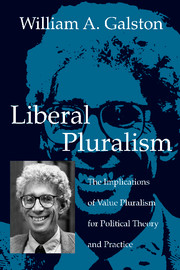Book contents
- Frontmatter
- Contents
- Acknowledgments
- LIBERAL PLURALISM
- I INTRODUCTION
- II FROM VALUE PLURALISM TO LIBERAL PLURALIST THEORY
- III THE PRACTICE OF LIBERAL PLURALISM
- 7 Democracy and Value Pluralism
- 8 Parents, Government, and Children: Authority over Education in the Liberal Pluralist State
- 9 Freedom of Association and Expressive Liberty
- 10 Liberal Pluralism and Civic Goods
- Index
10 - Liberal Pluralism and Civic Goods
Published online by Cambridge University Press: 20 March 2010
- Frontmatter
- Contents
- Acknowledgments
- LIBERAL PLURALISM
- I INTRODUCTION
- II FROM VALUE PLURALISM TO LIBERAL PLURALIST THEORY
- III THE PRACTICE OF LIBERAL PLURALISM
- 7 Democracy and Value Pluralism
- 8 Parents, Government, and Children: Authority over Education in the Liberal Pluralist State
- 9 Freedom of Association and Expressive Liberty
- 10 Liberal Pluralism and Civic Goods
- Index
Summary
REASONABLE DOUBTS ABOUT LIBERAL PLURALISM
My account of liberal pluralism is bound to trouble many readers. If I am right, the consequences of value pluralism include the recognition that there are normatively grounded restraints on the right of the state to enforce conceptions of justice and good lives on families and voluntary associations, even when those conceptions are attractive and endorsed by a strong majority of citizens. It is understandable that many contemporary liberals find this aspect of liberal pluralism deeply disturbing. By limiting the power of public institutions to shape individual and group practices, it permits what these liberals regard as retrograde behavior based on benighted beliefs. In many cases their judgment on the merits of these lives may well be correct. But if liberal pluralism means anything, it means internalized norms and habits that restrain us from compelling others to live life our way rather than theirs, even when we have good reason to believe that their way is mistaken.
Another key worry about liberal pluralism focuses on issues of power and public order. My account of political pluralism – of multiple sources of legitimate power – may seem to yield a dangerous indeterminacy when these diverse powers come into conflict. A key structural implication of pluralism is likely to intensify these doubts: Although some public disputes are unavoidable because they involve issues on which the political community as a whole cannot but take a stand, or which the community can only address through a system of uniform rules, many other disputes do not involve such issues.
- Type
- Chapter
- Information
- Liberal PluralismThe Implications of Value Pluralism for Political Theory and Practice, pp. 124 - 132Publisher: Cambridge University PressPrint publication year: 2002



